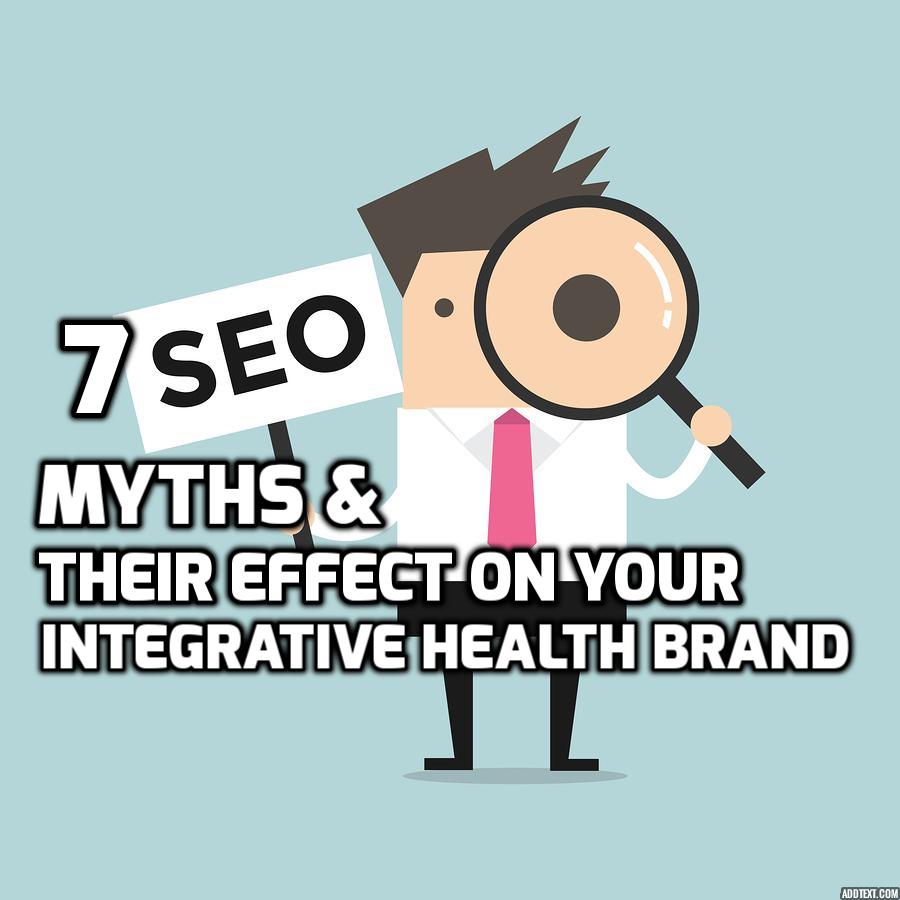7 SEO Myths & Their Effect on Your Integrative Health Brand
By Glenn Sabin

Search engine optimization (SEO) remains critical to driving traffic to your website to engage prospective patients and clients. However, fast-paced technology may have overtaken you. Your current efforts may be for naught, mistakenly based on outdated practices.
Over the last few years much has changed in terms of the algorithms Google uses to reward or penalize sites. If you’re not staying on top of this stuff, you’re likely falling short of today’s best practices.
Here are 7 SEO myths you need to be aware of:
Myth #1: I don’t need a mobile optimization strategy
If your website was created before, say, 2013, chances are it is not optimized across all portable devices, including smart phones and tablets.
It’s easy to determine if your site is ‘responsive’; simply search for your site on Google. If it returns a result that includes the words ‘mobile friendly’ under the site URL, then it is, and you will be rewarded with higher search results.
If it’s been a while since you’ve viewed your site on a cell phone or another smaller device, take a thorough look. Is it easy to navigate and engage various pages? Is it a rewarding user experience or a challenging encounter? The latter means your site is not optimized for mobile.
Enjoying this article? Subscribe and get our latest, delivered straight to your inbox.
Since Google’s mission is, in part, to ensure folks have the best user experience, it will not consider your site as valuable as those—including those of your competitors—who offer superior user experiences.
‘Responsive design’ is the term used for ensuring site development which is enjoyable on all devices. FON recently updated its site—originally built on Word Press in 2011 (eons ago!)—utilizing modern and responsive web design.
The work FON underwent was not all that expensive, mostly because the site had a solid structure that did not require a wholesale redesign. Yours may fit that category, too.
Myth #2: More content is better than high quality content
It used to be that the more content on a site, the better it was for search returns. This is no longer the case. A decent sized archive and ongoing production of fresh content (posts, not pages) is still important, but now Google also looks for the highest quality content.
You are wasting your time if you simply churn out content—and do not strive to make it outstanding in your category. Google (and other search engines like Bing and Yahoo!) will not reward mediocre; sophisticated readers will not return for your subpar dreck.
Myth #3: More links (to your site) are better than more content
More on the quality content theme…
It’s still great to have respected sites link to your own, but it’s not as important to search engines as original, high-quality content. Plus, when a visitor is referred to your site, YOUR amazing content gives them a reason to stick around. Content is the glue that engages. It’s key to connecting visitors to your brand.
Bringing people from high quality external links is vital, but make it worth their while by creating stellar content.
Myth #4: Exact keywords, oft-repeated, matter most for keyword optimization
Keyword stuffing with exact matches throughout your content actually penalizes search engine page rankings.
‘Semantic search’ went into effect with Google’s Hummingbird algorithm update in 2013. Semantic search improves search accuracy by better understanding searcher intent and contextual meaning.
Notice I’ve not repeated ‘SEO’ or ‘integrative health and medicine’ 27 times to this point? I don’t need to. It’s not my natural writing style to do so. Google, however, knows what I’m writing about. (Google knows everything.)
Bottom line: creating concise, well-written content will receive the accolades, even without exact keywords littered throughout; especially then.
Myth #5: SEO is not ALL about ranking
Showing up on page one at the top of the page, within the first three listings, is wonderful. We should all strive for that.
However, with search results now being appended by rich text snippets, click-through rates have increased for results further down the page, and on subsequent pages.
You may rank high for a particular keyword or key phrase, but your meta descriptions (the text appearing just below the link) may not be enticing enough for the user. Writing meta descriptions that get noticed will help drive more traffic to your pages, even if you are not found within the first few listings on page one.
Myth #6: Your homepage needs a lot of content
A busy homepage quickly turns off visitors. This is true when content is poorly organized and folks don’t know where to ‘start’ once they land on your page. You’ve got about six seconds to compel visitors to take action; if they’re confused, they’re outta there.
Content overcrowding on homepages remains a significant problem for many businesses. Search engines use bots to regularly crawl and index your site. Internal pages are crawled just like your homepage. There is no need to get everything on that first page.
An exception is made when a site is built for showcasing content (media-rich sites like FON) and is well organized and easy to navigate. I love long, scrolling homepages, even one-page designs that contain the content of an entire site.
Responsive, mobile design is causing people to do a lot less clicking and a whole lot more scrolling. FON’s homepage has an extensive scroll and features excerpts for 12 pieces of content. But it’s not crowded.
The goal should be to strike a balance between best for your brand and most useful for your customers and prospects.
Myth #7: Local SEO no longer matters
If you’re running an integrative or functional medicine practice, or a business that serves a specific geographic area, you must show up on local search to reach nearby prospects most likely to become clients or patients.
Google released its Pigeon algorithm in 2014 to enhance, in their words, “distance and location ranking parameters”. If you want to rank high for local search, you must unlock, verify, and importantly ‘optimize’ a Google My Business page. Do it today!
Conclusion
In today’s fast-paced digital marketing world it seems that one can blink and miss another SEO development. Separating myths from reality by staying current with trusted updates will help ensure that your integrative health business thrives.
About FON
FON is a leading integrative health and medicine business development and strategy consulting firm. FON specializes in custom solutions for growing patient volume, developing programs, and increasing product sales. Our practical business models are driven by innovative marketing, clear messaging, and customer engagement via branded storytelling.
Contact us today to schedule a complimentary 30-minute consultation to discuss your business development or personal brand needs.

Glenn Sabin, founder of FON and author of n of 1, is a nationally recognized thought leader who positions health innovators, enterprises, and organizations for sustainable growth. Leveraging deep experience in media, strategy, marketing, and business development—and his own compelling cancer journey—he champions personalized medicine and the generation of real-world data and evidence to help define a new, accessible standard of care.
Read Glenn’s story.




















